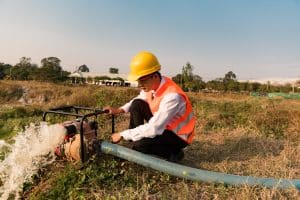Step-by-Step Guide to Obtaining Industrial Stormwater Certification
Intro
Are you looking to become certified as an industrial stormwater inspector in North Carolina? Obtaining industrial stormwater certification is a crucial step for anyone involved in stormwater management in industrial settings. This certification demonstrates your expertise and knowledge in ensuring compliance with regulations and protecting our environment. In this guide, we will walk you through the step-by-step process of obtaining industrial stormwater certification, including the role of an industrial stormwater inspector, prerequisites for certification, available programs in North Carolina, preparing for the certification exam, and maintaining your certification.
Understanding Industrial Stormwater Certification
Achieving industrial stormwater certification marks a professional milestone, signifying adeptness in scrutinizing industrial facilities to ensure they meet stormwater regulation standards. It encapsulates a broad spectrum of knowledge required to combat stormwater pollution effectively. As a certified industrial stormwater inspector, one’s duties are multifaceted, encompassing the inspection of industrial sites to pinpoint and mitigate sources of stormwater pollution. This role is paramount in advising on and implementing robust stormwater pollution prevention strategies. The National Pollutant Discharge Elimination System (NPDES) requires industrial facilities to develop and implement a Stormwater Pollution Prevention Plan (SWPPP) as part of their permit requirements.
certified industrial stormwater inspector, one’s duties are multifaceted, encompassing the inspection of industrial sites to pinpoint and mitigate sources of stormwater pollution. This role is paramount in advising on and implementing robust stormwater pollution prevention strategies. The National Pollutant Discharge Elimination System (NPDES) requires industrial facilities to develop and implement a Stormwater Pollution Prevention Plan (SWPPP) as part of their permit requirements.
Certification holders are expected to have a profound understanding of the regulatory framework governing stormwater management, including familiarity with the EPA industrial stormwater guidelines and state-specific permits such as the CA industrial stormwater permit. They are also versed in the development and oversight of Stormwater Pollution Prevention Plans (SWPPPs), a critical component in managing and reducing pollution from industrial activities.
Moreover, this certification ensures that inspectors can identify non-compliance issues and work effectively with facility operators to rectify these problems, thus safeguarding environmental health. The process of obtaining this credential typically involves comprehensive training and examination, designed to equip candidates with the necessary skills and knowledge to excel in this field. From understanding the intricacies of stormwater runoff to mastering the specifics of industrial SWPPP requirements, the certification journey prepares individuals to take on the challenges of maintaining industrial compliance with stormwater regulations. A study by the Environmental Law Institute found that fines for violating stormwater regulations can range from $2,500 to $75,000 per day of violation.
The Role of an Industrial Stormwater Inspector
The function of an industrial stormwater inspector is pivotal in the landscape of environmental protection, particularly within the industrial sector. These professionals carry the responsibility of ensuring that industrial sites adhere strictly to the regulatory requirements designed to minimize stormwater pollution. Through comprehensive site evaluations, inspectors identify potential pollutants that could be swept away by stormwater runoff into local water bodies, posing risks to both ecological and human health. A study by the Natural Resources Defense Council found that industries in California frequently violated their stormwater permits, with over half of inspected facilities exceeding pollution limits.
stormwater pollution. Through comprehensive site evaluations, inspectors identify potential pollutants that could be swept away by stormwater runoff into local water bodies, posing risks to both ecological and human health. A study by the Natural Resources Defense Council found that industries in California frequently violated their stormwater permits, with over half of inspected facilities exceeding pollution limits.
In collaboration with facility managers, inspectors are instrumental in the crafting and execution of Stormwater Pollution Prevention Plans (SWPPPs). These strategic documents outline specific measures facilities must take to mitigate stormwater pollution, such as the installation of sediment controls or the modification of operational practices to prevent contaminants from reaching waterways.
Beyond the development of SWPPPs, inspectors play a key role in educating facility operators on the importance of compliance and the potential environmental impacts of non-compliance. They also serve as a bridge between industrial entities and regulatory bodies, ensuring that communication is maintained and any issues of non-compliance are promptly addressed.
A significant part of an inspector’s duties includes monitoring and documenting the effectiveness of implemented stormwater control measures. This involves regular inspections and reporting that help in assessing the performance of SWPPPs and in making necessary adjustments to enhance stormwater management efforts.
In essence, the role of an industrial stormwater inspector is not only to enforce regulations but to foster a culture of environmental stewardship within the industrial sector, driving efforts to protect water quality and promote sustainable industrial practices.
Prerequisites for Certification
Embarking on the path to industrial stormwater certification requires a solid foundation in relevant fields and practical experience. Candidates are typically expected to have an educational background that could range from environmental science to civil engineering, providing the essential theoretical knowledge needed for understanding complex stormwater management systems. This academic groundwork is crucial as it encompasses the basic principles of hydrology, pollution control, and environmental regulations, forming the backbone of effective stormwater inspection.
In addition to educational prerequisites, hands-on experience in the field of stormwater management is invaluable. Prospective certification holders should have direct exposure to the challenges and strategies involved in controlling and preventing stormwater pollution. This experience can be gained through various means, such as working with environmental agencies, consulting firms, or industrial facilities directly involved in stormwater management practices.
Furthermore, preparatory training specific to stormwater inspection and management is a must. This training, which can sometimes be satisfied through online courses, is designed to bridge the gap between general environmental knowledge and the specific skills required for industrial stormwater inspection. It covers a broad range of topics from understanding the components of Stormwater Pollution Prevention Plans (SWPPPs) to navigating the legal and regulatory framework of stormwater compliance.
Lastly, certain certification programs may set a minimum requirement for years of experience in a related field, ensuring that candidates not only have theoretical knowledge but also practical understanding and the ability to apply their skills in real-world scenarios. This blend of education, hands-on experience, and targeted training forms the cornerstone for any individual aspiring to achieve certification in industrial stormwater inspection.
Industrial Stormwater Certification Programs in North Carolina
North Carolina offers a variety of routes for professionals seeking to achieve industrial stormwater certification, catering to the specific needs and schedules of individuals in this field. The state has established reputable programs that emphasize both theoretical knowledge and practical skills essential for effective stormwater management in industrial settings. Among these, the Stormwater Training Center is designed to equip inspectors with the tools they need to enforce and comply with stormwater regulations.
Additionally, a number of private entities provide specialized training programs that are recognized for their quality and relevance to the industry’s needs. These programs often range from intensive workshops to longer-term courses, and many offer the flexibility of online learning options, making it easier for working professionals to participate. Each program covers crucial topics such as the mechanics of stormwater runoff, the intricacies of the CA industrial stormwater permit, and the development of effective SWPPPs.
Prospective participants are encouraged to explore the range of available programs to find one that aligns with their learning preferences and professional objectives. Key considerations should include the program’s accreditation, the depth of its curriculum, and its success rate in preparing candidates for the certification exam. By selecting a program that offers a blend of regulatory insight, environmental science, and practical application, candidates can position themselves for success in obtaining their industrial stormwater inspector certification in North Carolina.
Preparing for the Certification Exam
Adept preparation is key to excelling in the certification exam for becoming an industrial stormwater inspector. Begin your journey by delving into comprehensive study materials that cover the breadth of knowledge expected of a certified professional. According to the Stormwater Training Center, this includes understanding stormwater management practices, regulatory frameworks such as the EPA industrial stormwater guidelines, and the specifics of crafting and implementing SWPPPs. Engage in training courses, which can range from online modules to in-person workshops, focusing on areas like the nuances of the CA industrial stormwater permit and effective pollution prevention strategies.
Immersing yourself in practice exam questions will sharpen your test-taking skills, helping you to identify any areas where your understanding may need reinforcement. Additionally, a proactive approach to keeping abreast of the latest industry trends, technological advancements, and shifts in regulations will not only aid in exam preparation but also in your future career as an industrial stormwater inspector. This ongoing learning process is vital, as it ensures that your knowledge base remains current and comprehensive.
understanding may need reinforcement. Additionally, a proactive approach to keeping abreast of the latest industry trends, technological advancements, and shifts in regulations will not only aid in exam preparation but also in your future career as an industrial stormwater inspector. This ongoing learning process is vital, as it ensures that your knowledge base remains current and comprehensive.
Collaboration with peers and mentors can also provide invaluable insights and tips for tackling the exam successfully. Sharing experiences and strategies can help illuminate complex topics and foster a deeper understanding of the material. Remember, the certification exam is a rigorous assessment of your expertise and readiness to take on the critical role of ensuring industrial compliance with stormwater management regulations. A thorough, well-rounded preparation strategy is your best tool for achieving certification and advancing your career in this vital environmental field.
Maintaining Your Certification
Keeping your industrial stormwater inspector certification active involves engaging in ongoing education and staying abreast of evolving industry practices. Continual learning through workshops, webinars, and conferences is crucial for keeping pace with the latest environmental regulations and stormwater management strategies. Additionally, periodic re-certification or completion of continuing education units (CEUs) may be required by certifying bodies to ensure that your knowledge and skills remain sharp and relevant. Active participation in professional networks or associations related to stormwater management can also offer valuable resources and updates on legislative changes, new technologies, and best practices in the field. Engaging with these communities not only enhances your professional development but also strengthens your capability to effectively navigate the complexities of industrial stormwater management. Committing to these practices affirms your dedication to safeguarding water quality and underscores your role as a vital contributor to environmental stewardship.
